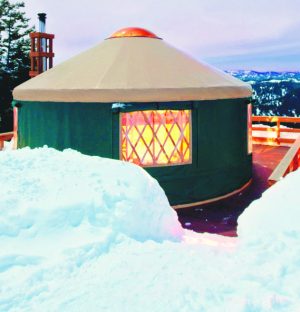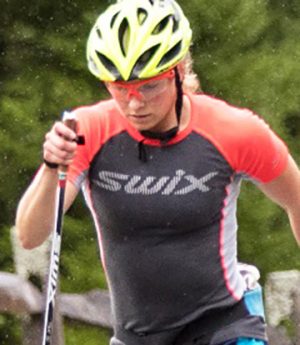July 22, 2009 (Fairview, Alberta) – When he worked as a lift attendant at a ski resort on Vancouver Island, Reef Caulder may not have known what his future would bring, but he knew what he wanted – to be a mechanic.
Caulder admits he’s always enjoyed taking machinery apart. Over the years, those projects expanded from clocks to bicycles to cars. After he graduated from high school, he worked on a number of golf courses as groundskeeper and assistant mechanic. He worked on Mt. Washington for five seasons, became fascinated with the heavy-duty snow equipment – and never forgot the experience.
Back on golf courses, the 26-year-old Nanaimo native came to realize he needed official training if he was to get the mechanic jobs he wanted. He researched the various trades programs available, then asked around for recommendations. In the end, the choice was simple and he enrolled in the one year Turfgrass Equipment Technician (TET) program at GPRC’s Fairview College Campus (formerly NAIT’s Fairview Campus) in Fairview, Alberta.
“The course was great because it gave full training. They didn’t just give you the basics and then expect you to go out and learn the rest on the job. Every part of the course was beneficial,” said Caulder.
The program starts with a month-long distance education module beginning in September. This allows those students working on golf courses to finish their seasonal work schedules. Classroom study begins October 1 and the program finishes at the end of April. Working in the industry beforehand was a benefit, at least for Reef.
“I think it was the key to my success with my grades and my learning process. Knowing how the machines work and how they are ‘really’ used is key to troubleshooting and fixing problems,” commented Caulder.
According to Bear Moffatt, an instructor in the TET program, the 32-week course begins with the fundamentals like tool handling and safety, but quickly moves into the nuts and bolts – and diagnostics – of engine maintenance and repair. The equipment in the program is identical to that used on golf courses, but three other modules – Marine, Recreation and Power – provide additional training for other small machinery, such as boat engines, ATVs and generators. The TET program is so wide-ranging and comprehensive training that students can find jobs, not just on golf courses, but also in municipal public works departments and parks. The certificate programs also include a work practicum.
Contrary to only a few years ago, nearly all golf course equipment is now diesel. Moffatt remarked they are no more trouble-free than gas engines – and just as much in need of good mechanics. Today’s high-tech diagnostic equipment means technicians must have computer skills and even inventory management knowledge as well. The TET program includes these modules too.
“It was very well done. I learned a lot,” Reef admits.
He was still interested in heavy-duty equipment, though. When he graduated from the TET program, he had expected to return to the golf course where he had been working, but that job wasn’t available. He turned to a company whose distribution centre had featured in a field trip from the TET program and was hired by Oak Creek Golf and Turf Inc, a Calgary-based equipment dealer with branches across western Canada.
“And that’s where it started to happen.” Reef explained, and his story is still unfolding. At his new employer, he has continued to improve his mechanical skills and knowledge, first taking the Heavy Duty Mechanic apprenticeship program at Fairview and then more mechanical training at SAIT, which is closer to where he works.
That’s the beauty of the TET program, Moffatt declared. When students complete it, they can certainly get jobs, but they can also look higher. They will have the knowledge to write the 4th year OPET (Outdoor Power Equipment Technician) apprenticeship exam. Doing so while what they’ve learned is still fresh in their minds is a definite advantage. After that, they need only get the hours in the workplace to qualify for their journeyman’s ticket – 4,000 hours, or about four years of work as a mechanic.
With TET under their belts, aspiring mechanics can also enter other trades programs at the second year level, as Reef did. He is getting closer to his goal all the time. He still needs up to eight weeks more of training and 1,500 hours of work to qualify as a journeyman – but he is confident that will happen.
Working at Oak Creek has given Reef another bonus – exposure to the big heavy-duty hydraulic machinery he loves best. The company is the western Canada distributor for the German-made Pisten Bully, a line of specialized ski hill grooming equipment. While there are many ski hills around Calgary using the equipment, Reef is currently focused on a very special one. His mechanical aptitude on this large machinery is leading him straight to Whistler – and the 2010 Winter Olympics.
Reef is part of a crew of mechanics and technicians who will be working at Whistler to help maintain the equipment needed to groom the slopes for Olympic events. He has traveled there already for special training sessions, most recently in May this year. He expects to be on site full-time by the end of 2009. There are about 40 machines already in place, along with a skeleton crew of mechanics.
The big tractor-tread machines will have a critically-important job – but few visitors will see them. They will be working late and long hours, beginning when the Olympic events end around 4:30 pm. Then they move them out to repair, build and groom the event slopes until 8:00 am. Although Reef will not actually be working the machines, he’ll be one of the team of mechanics ready to fix any equipment that develops problems – day or night. He does have to test drive them to ensure they are ready for action.
The million dollar question has to be, will he have time to watch any of the Olympic events? Reef is philosophical. It’s a question he can’t answer positively, but if he could, “The snowboard half pipe would be where my eyes would be locked.”
Although the path from lawnmowers to snow moving equipment did involve some luck, Reef has been very focused on what he wanted from the start – and has studied hard to make sure he gets the skills he needs to further his career.
Reef admits to being a passionate golfer, skier, snowmobiler and hockey player. He can indulge all of these interests because he has a good, full-time job in an industry where technicians are always in demand.
Golf courses are working, even in winter, Moffatt revealed. Playing golf may be a summer pastime, but the work behind the scenes isn’t. In winter, golf course equipment has to be repaired, maintained, and readied for the finer weather. Grass-cutters, sprayers, irrigation equipment, pesticide applicators, fertilizer spreaders and ATVs are all standard on golf courses these days.
“Mechanics at golf courses are full-time,” Moffatt declared.
The TET program has stellar credentials. Graduates now work in golf courses around the world. In an era where the job market is shrinking, jobs like these are excellent career opportunities. There is no lack of either ski hills or golf courses, and the demand both for the specialized equipment, and the mechanics to service them, is growing.
Reef Caulder declares that for him, the TET program was life-changing and he highly recommends it.
“The Fairview program was where it all started for me. That’s where I got the work tools and knowledge to continue.”
NAIT’s Fairview Campus became the Fairview College Campus of Grande Prairie Regional College (GPRC), effective July 1, 2009, offering post-secondary education options in a range of fields.
For more information visit: www.gprc.ab.ca
Top News Stories
Reef Caulder’s 2010 Olympic Dream on a Pisten Bully
by Beverley Candy/Grande Prairie Regional CollegeLeave a Reply
You must be logged in to post a comment.






![National camp action [P]...](https://skitrax.com/wp-content/uploads/2019/08/Duluth-4-2019-08-08-at-10.46.51-AM-300x246.png)
![Matt Liebsch on the CXC Elite Team [P] CXC...](https://skitrax.com/wp-content/uploads/2019/08/Matt-Liebsch-CXC.2-525x700.4-300x267.jpg)
![Dan LaBlanc [P]...](https://skitrax.com/wp-content/uploads/2019/08/Dan-LaBlanc-img_1855.3.jpg)

![Reef Caulder with his Piston Bully and 2010 Olympic dreams...[P]Grande Prairie Regional College](http://skitrax.com/skitrax22/images/skitrax/4a6731ffb4abcReef5 small.jpg)